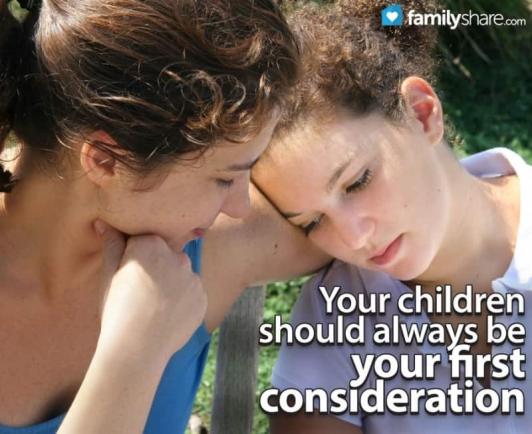
Research has shown that serious, open and ongoing parental conflict within the home can be more damaging to children than the pain of a divorce. Sometimes a loving single-parent home is a healthier place for children. Even if divorce is the best and most realistic option it still brings with it a certain amount of pain and uncertainty for both adults and children. Parents sometimes hesitate to tell their children of their decision because they worry about their reactions. Children generally respond to news of marital breakup with surprise, sadness and sometimes anger. They might blame one parent over the other, feel guilty or feel caught in the middle. Your children will most likely go through a wide range of emotions as they process this news. Realize that these feelings are inevitable and that, as a parent, there are ways to help your child through this difficult time. There are also things you should avoid in order to prevent additional problems and distress. The following are some things that you should not do when telling your children about your divorce.
1. Don't put it off
It is important to tell children as soon as a decision is made, especially if other people know about it. Parents often dread this task because they fear hurting their children and have probably tried to protect them from marital conflict. Most children will be surprised by the news, but others will not. Even though it will be upsetting to your children when you do tell them, hearing rumors about the breakup from other children or adults will be more damaging to them and will undermine the trust they have in you.
2. Don't minimize the reality of divorce
Children of all ages need to know what the immediate impact of divorce will be on their own lives. Let them know that there will be changes in all of your lives and that it might be difficult for a while but that you will be there to help them through it. Honestly answer questions such as when they will see the non-custodial parent, whether or not they will still have contact with extended family members, where they will live and whether their siblings will be separated from them. Answers to these concrete questions will provide a sense of stability during an otherwise confusing time.
3. Don't vilify your spouse
Despite your personal differences with your spouse, your children love their other parent and should not be persuaded otherwise. Do not tell your children the personal details of your relationship with your former spouse. They do not need to know the ways that he or she behaved badly in the marriage. Instead, encourage your child to develop a good relationship with his other parent. Having a strong relationship with both parents will better equip your child to weather the uncertainty and pain of divorce. Because they are innocent victims of a heartbreaking situation, what is best and most beneficial to your children should always be your first consideration.

